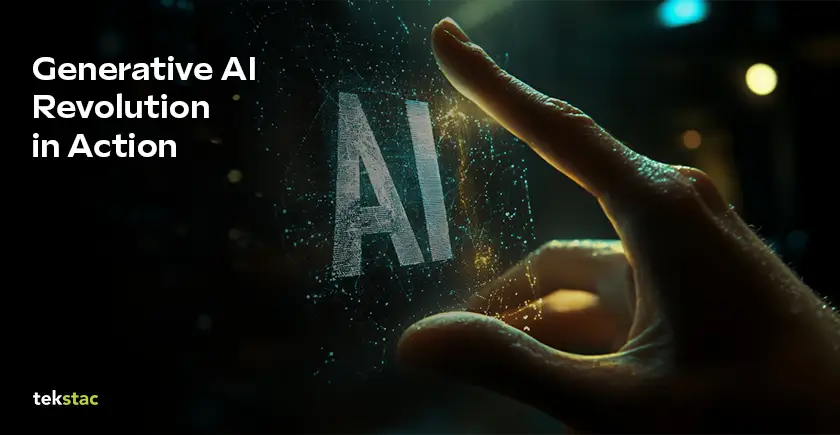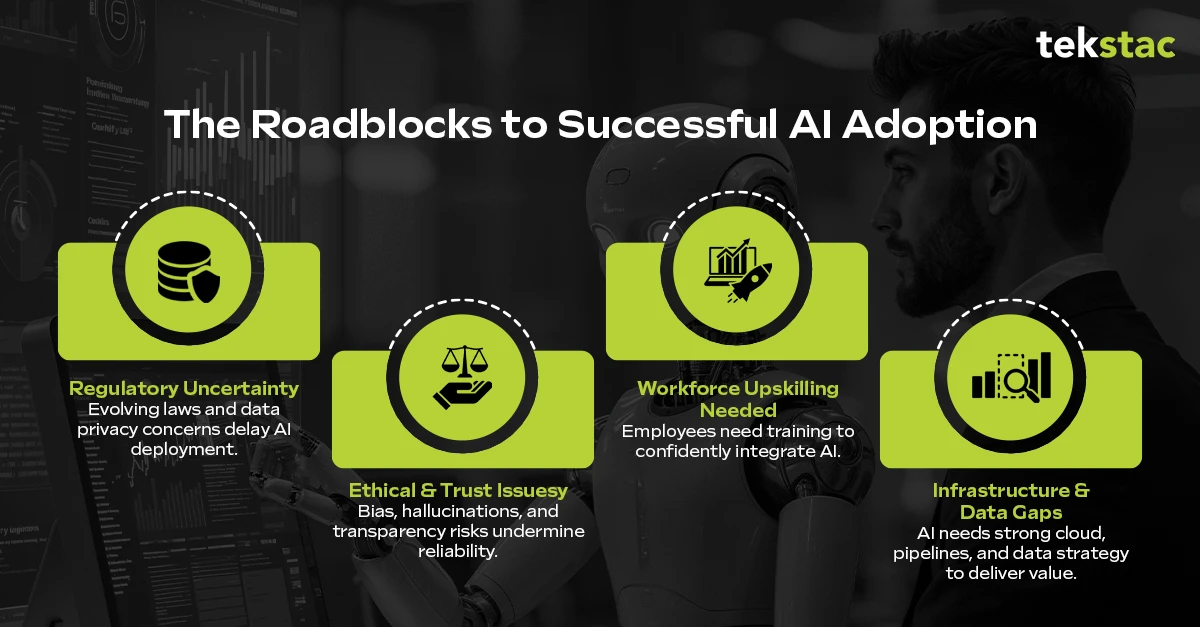The Generative AI Revolution: How Enterprises Are Transforming Business
April 30, 2025

Last updated on November 13th, 2025
According to Deloitte’s 2025 “State of Generative AI in the Enterprise” report, the Generative AI Revolution is no longer theoretical—it’s redefining how businesses innovate, automate, and grow. Organizations across industries are integrating GenAI models into their core strategies to enhance productivity, reduce risk, and accelerate decision-making.
What is the Generative AI Revolution?
The Generative AI Revolution refers to the rapid adoption of AI systems capable of creating original content, insights, and automation workflows across industries. It marks a shift from traditional AI, which analyzes data, to generative models that create, simulate, and innovate, transforming how enterprises operate and compete.
What Is Driving the Rise of Generative AI?
The adoption of GenAI marks one of the most significant technological advancements of the decade. From enhancing business operations to driving innovation, the generative AI revolution is reshaping industries at an unprecedented pace. The Deloitte report emphasizes that organizations are no longer merely exploring GenAI; they are actively integrating it into their core business strategies. However, the speed at which AI is evolving far outpaces the ability of enterprises to fully harness its potential, leading to a crucial gap between innovation and execution.
The Real Challenges of Generative AI Adoption in Enterprises
Despite the excitement around GenAI, its widespread adoption faces several hurdles. Deloitte’s research identifies key barriers that organizations must overcome to maximize AI’s value:

1. Regulatory and Compliance Uncertainty
The legal landscape surrounding AI is still evolving, and organizations must navigate complex regulations to ensure compliance. Many business leaders hesitate to fully deploy GenAI due to concerns about data privacy, intellectual property rights, and ethical AI usage. Governments worldwide are working on frameworks to regulate AI, but the uncertainty slows down enterprise adoption.
2. Trust, Risk, and Ethical Concerns
AI-generated content, while impressive, is not infallible. Issues such as bias, hallucinations (incorrect AI outputs), and lack of transparency pose significant risks. Organizations must invest in robust risk management frameworks and governance models to ensure AI reliability and maintain stakeholder trust.
3. Workforce Readiness and Upskilling
While many employees have access to AI tools, a significant percentage are not yet leveraging them effectively. Integrating AI into business workflows requires comprehensive training programs to upskill employees, ensuring they can utilize AI tools to their full potential rather than viewing them as threats to job security.
4. Infrastructure and Data Strategy
A strong technical foundation is critical for successful AI deployment. Enterprises need scalable cloud solutions, high-quality data pipelines, and seamless integration between AI models and existing business applications. Without a well-structured data strategy, even the most advanced AI models will struggle to deliver meaningful value.
Top Wins and Industry Use Cases in the Generative AI Revolution
Enterprises in North America, Europe, and Asia-Pacific are leading the Generative AI Revolution, with cross-industry adoption accelerating in manufacturing, BFSI, and healthcare.
While adoption varies by industry and function, certain areas are experiencing rapid and substantial benefits from GenAI:
1. IT and Cybersecurity
AI-driven automation is transforming software development, threat detection, and system monitoring. Security teams are leveraging GenAI to analyze vast amounts of threat data, proactively preventing cyberattacks and reducing response times.
2. Operations and Supply Chain Optimization
Predictive analytics powered by AI is helping companies optimize inventory, reduce waste, and improve supply chain resilience. AI-generated insights are enabling real-time decision-making, minimizing operational disruptions.
3. Marketing and Customer Experience
Personalized content creation, AI chatbots, and automated customer interactions are enhancing engagement and efficiency. GenAI’s ability to analyze consumer behavior and generate targeted marketing strategies is revolutionizing brand positioning.
4. Healthcare and Life Sciences
From accelerating drug discovery to improving patient diagnostics, GenAI is making significant contributions to healthcare. AI models are analyzing vast datasets to uncover patterns, assisting in clinical trials, and even predicting disease outbreaks.
Measuring ROI: Is Generative AI Meeting Business Expectations?
Deloitte’s findings reveal that while ROI on GenAI investments is generally positive, some areas outperform expectations while others lag.
- Cybersecurity leads the pack, with 44% of AI-driven initiatives exceeding ROI expectations due to AI’s ability to detect and prevent security threats more effectively than traditional methods.
- Marketing and customer service show strong adoption, but businesses still face challenges in integrating AI into their workflows seamlessly.
- Sales and finance functions report lower-than-expected returns, suggesting that organizations need better-defined AI strategies and execution plans in these domains.
The report also highlights that 76% of organizations are willing to wait at least a year before expecting substantial financial returns, reflecting confidence in AI’s long-term potential.
From Generative AI to Agentic AI: The Next Phase of Automation
As businesses move beyond GenAI’s initial capabilities, the next frontier is Agentic AI autonomous AI systems that can execute tasks, make decisions, and coordinate workflows with minimal human intervention.
These AI agents are poised to transform:
- Enterprise automation by managing routine business processes independently.
- Decision-making by synthesizing data from multiple sources and providing real-time recommendations.
- Collaboration by integrating seamlessly with human workers to enhance productivity.
Despite their promise, AI agents come with new challenges, including ethical considerations, data security risks, and the need for even more sophisticated governance structures. Organizations must lay the groundwork now by investing in scalable AI frameworks and developing responsible AI policies.
Strategic Considerations for Business Leaders in the Generative AI Era
Deloitte’s report provides strategic recommendations for organizations looking to maximize GenAI’s potential:
1. Align Leadership and Business Strategy
CxOs must shift from being AI cheerleaders to AI champions, actively guiding their organizations through the transformation process. Senior leadership must bridge the gap between technical and business teams to ensure AI investments align with strategic goals.
2. Focus on Sustainable ROI
Rather than chasing multiple AI experiments, organizations should focus on high-impact use cases that drive measurable value. Layering AI onto existing workflows, rather than overhauling entire processes, can accelerate adoption and results.
3. Prioritize Workforce Engagement and AI Literacy
GenAI is not a replacement for human workers but a tool to augment their capabilities. Companies must invest in training programs to build AI literacy, foster employee trust, and drive innovation from within.
4. Prepare for AI Governance and Ethical AI Adoption
Regulatory compliance, data security, and ethical AI deployment should be central to any GenAI strategy. Establishing clear guidelines for responsible AI use will be critical as AI continues to evolve.
A Defining Moment for Enterprises Embracing Generative AI
The businesses that succeed in the AI era will not be those that simply deploy the latest tools, but those that integrate AI into their long-term vision, driving innovation, enhancing efficiency, and redefining what’s possible in the digital age. The future of AI is unfolding now, and the time to act is today.
To understand how the broader AI Revolution is driving creativity, innovation, and new business models beyond automation, explore our in-depth analysis in The AI Revolution: What’s Next for Businesses in 2026.
FAQs on Gen AI Revolution
1. How is Generative AI transforming business operations?
Generative AI is automating complex workflows, accelerating decision-making, and personalizing customer experiences. It helps enterprises cut costs, enhance productivity, and innovate faster by generating insights, content, and simulations at scale.
2. Which industries are leading the Generative AI Revolution?
Technology, BFSI, healthcare, and manufacturing are at the forefront of the Generative AI Revolution. These sectors use AI to optimize supply chains, strengthen cybersecurity, improve diagnostics, and deliver intelligent digital experiences.
3. What challenges do enterprises face in AI adoption?
Key challenges include regulatory uncertainty, data privacy concerns, ethical governance, and workforce readiness. Many organizations still lack the infrastructure and upskilling needed to scale AI responsibly across business functions.
4. Who will survive the AI revolution?
Enterprises that align AI strategy with business goals, invest in workforce upskilling, and adopt responsible governance will lead the next phase. Success depends on combining innovation with ethical, data-driven execution.





